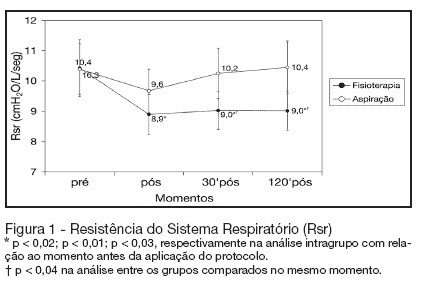You searched for:"Cláudia Adegas Roese"
We found (2) results for your search.-
Noninvasive positive pressure ventilation in patients with acute respiratory failure after tracheal extubation
Rev Bras Ter Intensiva. 2007;19(2):273-274
-
Artigos originais
Behavior of the lung mechanics after the application of protocol of chest physiotherapy and aspiration tracheal in patients with invasive mechanical ventilation
Rev Bras Ter Intensiva. 2007;19(2):170-175
Abstract
Artigos originaisBehavior of the lung mechanics after the application of protocol of chest physiotherapy and aspiration tracheal in patients with invasive mechanical ventilation
Rev Bras Ter Intensiva. 2007;19(2):170-175
DOI 10.1590/S0103-507X2007000200005
Views0See moreBACKGROUND AND OBJECTIVES: The chest physiotherapy (CP) in patients submitted to invasive support ventilation acts directly in the breathing system, and it could alter the lung mechanics through the dynamic lung compliance (DynC) and resistance of the breathing system (Rbs). However the alterations after the accomplishment of CP are still controversy. The objective of this study was to evaluate the alterations of the lung mechanics in patients in invasive mechanical ventilation (IMV). METHODS: It was a prospective, randomized, and controlled and crossover study, with patient with more than 48 hours in IMV. The protocol of chest physiotherapy and isolated tracheal aspiration they were randomized for the application order with a window of 24 hours among them. Data of lung mechanics and its varied cardiorespiratory were collected moments before the protocol, immediately after the application of the protocol, 30 minutes and 120 minutes after the application of the protocols. RESULTS: Twelve patients completed the study. Pneumonia was the mean cause respiratory failure (RF). There was not statistical difference among the groups in relation to Cdyn, volume tidal (Vt) and volume minute (Ve). Rbs decreased in a significant way immediately after (of 10.4 ± 3 cmH2O/L/seg for 8.9 ± 2 cmH2O/L/seg; p < 0.02), 30 minutes after (of 10.4 ± 3 cmH2O/L/seg for 9 ± 2 cmH2O/L/seg; p < 0.01) and 120 minutes after (of 10.4 ± 3 cmH2O/L/seg for 9 ± 2 cmH2O/L/seg; p < 0.03) application the protocol of chest physiotherapy. When compared with the protocol of isolated tracheal aspiration it was significantly smaller in the 30 (9 ± 2 cmH2O/L/seg versus10.2 ± 2 cmH2O/L/seg; p < 0.04) and 120 minutes (9 ± 2 cmH2O/L/seg versus 10.4 ± 3 cmH2O/L/seg; p < 0.04). CONCLUSIONS: The protocol of chest physiotherapy was effective in the decrease of Rsr when compared with the aspiration protocol. That decrease was maintained for two hours after its application, what did not happen when only the just accomplished the tracheal aspiration was performed isolated.

Search
Search in:
KEY WORDS
Case reports Child Coronavirus infections COVID-19 Critical care Critical illness Extracorporeal membrane oxygenation Infant, newborn Intensive care Intensive care units Intensive care units, pediatric mechanical ventilation Mortality Physical therapy modalities Prognosis Respiration, artificial Respiratory insufficiency risk factors SARS-CoV-2 Sepsis




